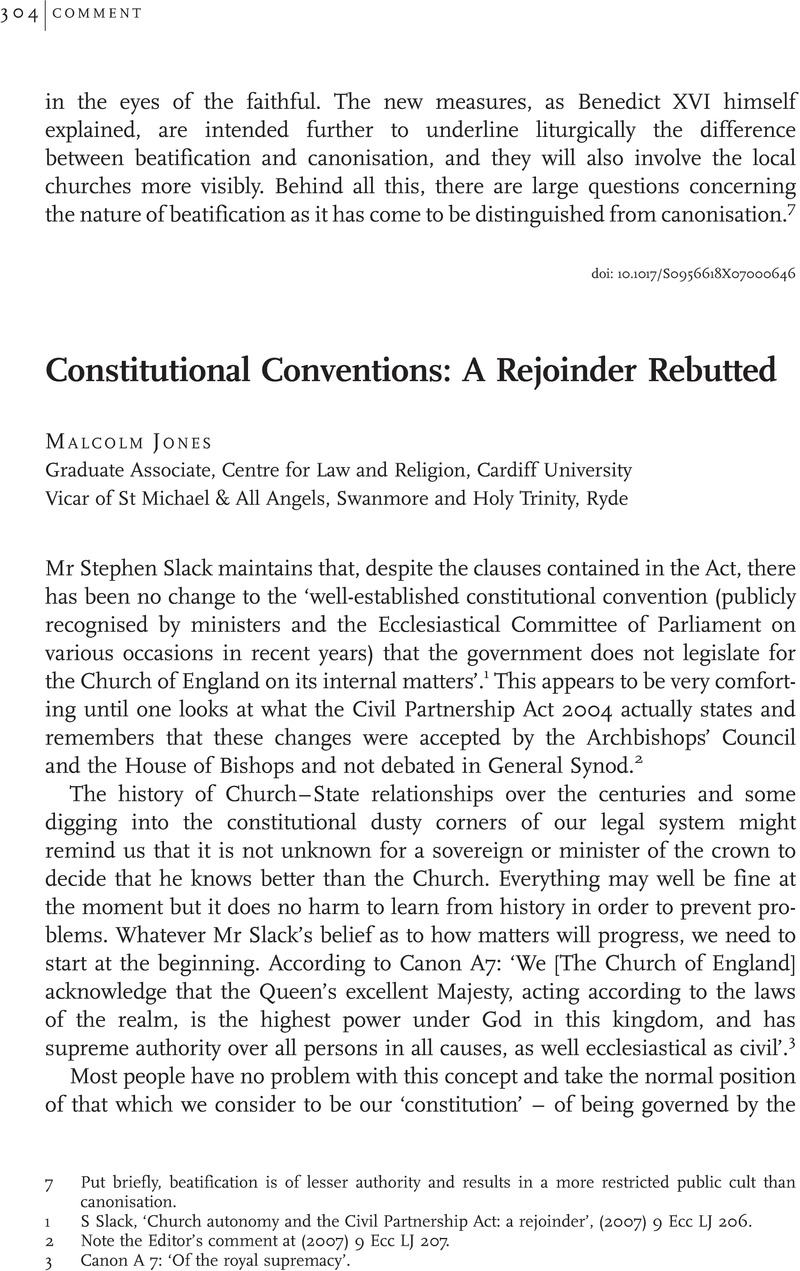No CrossRef data available.
Article contents
Constitutional Conventions: A Rejoinder Rebutted
Published online by Cambridge University Press: 28 August 2007
Abstract

- Type
- Comments
- Information
- Copyright
- Copyright © Ecclesiastical Law Society 2007
References
1 Slack, S, ‘Church autonomy and the Civil Partnership Act: a rejoinder’, (2007) 9 Ecc LJ 206Google Scholar.
2 Note the Editor's comment at (2007) 9 Ecc LJ 207.
3 Canon A 7: ‘Of the royal supremacy’.
4 Ecclesiastical Law: Halsbury's Laws of England, vol 14 (Church Assembly Edition, London, 1957).
5 The Southern Rhodesia Act 1965 was in response to Ian Smith's Unilateral Declaration of Independence in Southern Rhodesia. It enacted that Rhodesia remained a British dominion and it invalidated all legislation passed by the ‘illegal’ regime. The Canada Act 1982 altered sections of the British North America Acts passed in the nineteenth century. Eskimos of the Canadian population objected, stating that the Acts could not be altered without the consent of all the provinces and peoples, including themselves.
6 For the Southern Rhodesia Act, see Madzimbamuto v Lardner-Burke [1967] AC 645, where the Privy Council decided, on a complaint about the legality of the detention of the complainant, that the Act did apply and that his detention was illegal. In the case of the Eskimos in Manual v Attorney-General [1983] Ch 77, the Court of Appeal was of the opinion that it was not in its remit to inquire if non-compliance with a particular convention could ‘impair’ something decided by the sovereign in parliament. See Carroll, A, Constitutional and Administrative Law (London, 1998), p 49Google Scholar.
7 Examples of this are often found in the world of national security: for example, R v Home Secretary, ex parte Cheblak [1991] 2 All ER 319, when Lord Donaldson MR commented that the Home Secretary was ‘fully accountable to Parliament for his decisions whether or not to deport’; see A Carroll, Constitutional and Administrative Law, p 50.
8 Lord Hardwicke's Marriage Act, which invalidated all marriages not carried out in facie ecclesiae, was overturned by the Marriage Act 1836 which allowed for civil marriage and ‘restored the old principle of canon law that marriages are valid though contracted outside the church’: The Canon Law of the Church of England, The Report of the Archbishops’ Commission (London, 1947), p 66.
9 Carried over into the Matrimonial Causes Act 1965, s 8(2)(a).
10 Scott-Joynt, M, ‘The Civil Partnership Act 2004: dishonest law?’, (2006) 8 Ecc LJ 91Google Scholar.
11 Church of England (Worship and Doctrine) Measure 1974, s 5(1).
12 Ibid s 6(1).
13 Book of Common Prayer (London).
14 ‘[to] amend, repeal or (as the case may be) revoke any church legislation’.
15 R v Ecclesiastical Committee, ex parte the Church Society [1994] 6 Admin LR 670, reproduced in Hill, M, Ecclesiastical Law (second edition, Oxford, 2001), pp 667–671Google Scholar.
16 Halsbury's Laws of England, vol 44, para 857.
17 This Durham-based society was set up by the old Central Advisory Council for the Training in the Ministry for men who had been in industry and who had been selected for training for the ordained ministry of the Church of England. It was a one-year course to bring them up to an academic standard in order to cope with theological college training and the General Ordination Examination. Many subjects were covered, including an introduction to criminal and family law. Durham University Extra Mural Department was involved with parts of the course. Sadly it no longer exists, but it did great work.


